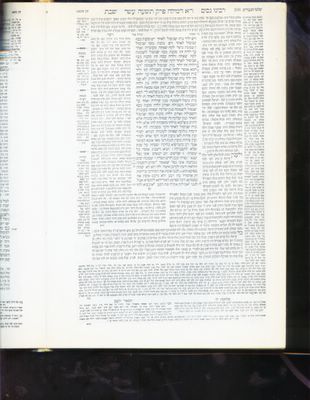
HIDE/SHOW IMAGE
54b
{Shabbat 135b continues}
and there is [a slave] born in his [master's] house who is circumcised on the first [day]. There is [a slave] bought with money who is circumcised on the first [day], and there is [a slave] bought with money who is circumcised on the eighth day.
How so?
If one purchases a pregnant female slave and then she gives birth, that [the infant] is an acquired slave who is circumcised at eight days. If one purchases a female slave together with her infant child, that is a slave bought with money who is circumcised on the first day. If one purchases a female slave and she conceives in his house and gives birth, that is [a slave] born in his [master's] house who is circumcised at eight days. Rabbi Chama says: If she gives birth and then has a ritual bath, { - by this rite she enters the Jewish household as slave, becoming liable to all duties enjoined upon a Jewish woman} that is [a slave] born in his [master's] house who is circumcised on the first day; if she has a ritual bath and then gives birth, that is [a slave] born in his [master's] house who is circumcised at eight days.
But the first Tanna allows no distinction between one who [first] has a ritual bath and then gives birth and one who gives birth and then has a ritual bath, so that even though his mother is not defiled through her giving birth he is circumcised on the eighth day.
Rava said: As for Rabbi Chama, it is well: we find [a slave] born in his [master's] house who is circumcised on the first day, and [a slave] born in his [master's] house who is circumcised on the eighth day -- such that she gave birth and then ritually immersed, and where she ritually immersed and then gave birth. One bought with money who is circumcised on the eighth day - if one purchases a pregnant female slave and she has a ritual bath and then gives birth. One bought with money who is circumcised on the first day - where one buys a [pregnant] female slave and another buys her unborn child.
But, according to the first Tanna, as for all [others] it is well: they are conceivable.
Rabbi Yirmiya said: In the case of one who buys a female slave for her unborn child.
This is satisfactory on the view that a title to the fruit is not as a title to the principal; but on the view that a title to the fruit is as a title to the principal, what can be said?
Rav Mesharshiya said: [It is possible] where one buys a female slave on condition that he will not subject her to a ritual bath. {There her child is certainly unlike a Jewish-born one.}
They learnt {in a brayta}: Rabban Shimon ben Gamliel says: Any human being who lives thirty days is not a nefel, for it is stated {Bemidbar 18:16}:
As regards the wife of one's brother, which are of those carrying a kareit penalty, the Sages were stringent, such that one does not perform yibbum in case of doubt {e.g. of whether there was child or not}, but as regards mourning, the Sages were lenient in this.
{Shabbat 136a}
It was a question to them:



No comments:
Post a Comment